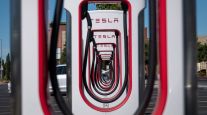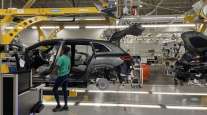Managing Editor, Features and Multimedia
Paccar’s New CTO Sees Electrification, Autonomy Transforming Truck Market
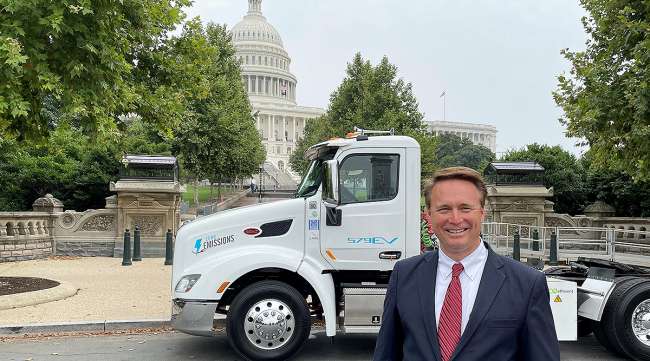
[Stay on top of transportation news: Get TTNews in your inbox.]
WASHINGTON — After years of working with emerging technologies in the automotive sector, Paccar Inc.’s new chief technology officer sees a similar transformation unfolding in the commercial truck market.
John Rich, who joined Paccar in March following a 30-year career at Ford Motor Co., cited electrification, autonomous driving and connected vehicles as the main trends driving the future of heavy- and medium-duty trucks.
“Those are the core technology pillars that are converging at the same time and forcing change,” Rich said during a July 29 interview with Transport Topics in front of the U.S. Capitol, where Paccar was showcasing two zero-emission Class 8 trucks.
A day earlier at the U.S. Department of Energy headquarters, the truck maker provided tours of its battery-electric Peterbilt Model 579EV and a hydrogen fuel cell-electric Kenworth T680 to Energy Secretary Jennifer Granholm and members of Congress.
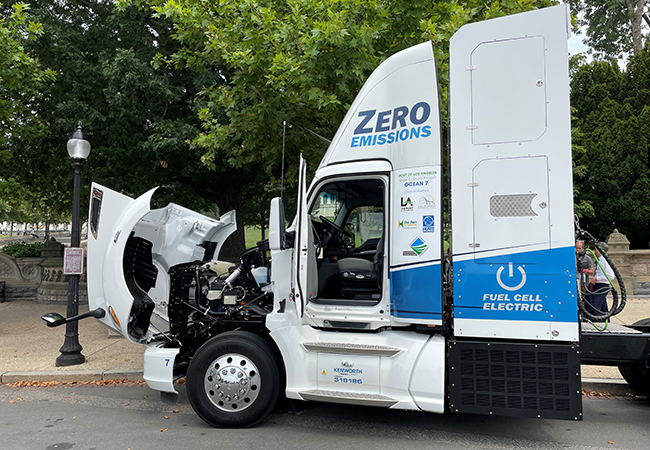
A hydrogen fuel cell-electric Kenworth T680 on display near the U.S. Capitol on July 29. (Seth Clevenger/Transport Topics)
While fuel cell trucks are still in the pilot phase, Paccar’s two North American brands, Kenworth and Peterbilt, have already introduced three battery-electric models under each nameplate.
“We’ve made our first deliveries of [electric] trucks,” Rich said. “There’s a lot of talk, a lot of pilot projects, a lot of test fleets, a lot of samples, but cold, hard cash for a truck is a rarity, and we’ve done that in a couple of places.”
While meeting with regulators and elected officials, Paccar encouraged collaboration between industry and government to help spur the successful deployment of these types of electric trucks, Rich said.
“We’re trying to stress that this is not an industry that’s afraid of the change,” he said. “We’re just trying to get it done at a measured and predictable pace that works for the industry and works for the economy.”
He said government incentives and grants to help defray the higher cost of electric vehicles and funding for the charging infrastructure to support them are “very important building blocks” in this early phase of adoption.
Another topic of discussion was the ongoing supply challenge caused by the shortage of semiconductor chips for new vehicles, Rich added.
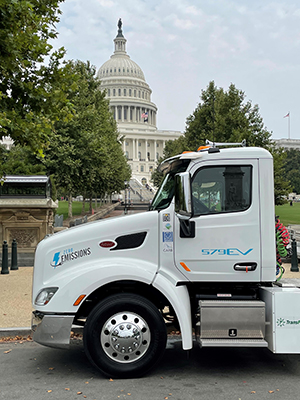
A battery-electric Peterbilt Model 579EV parked near the U.S. Capitol on July 29. (Seth Clevenger/Transport Topics)
Meanwhile, Paccar continues to pursue advanced driver-assist systems as well as SAE Level 4 autonomous vehicles through its partnership with self-driving truck developer Aurora.
Rich said vehicle manufacturers and autonomous vehicle companies are working together more effectively in the commercial truck space than in the robo-taxi business, where tech companies and car makers are more concerned about overlap between their businesses.
“We know our swim lanes and our businesses run nicely in parallel with each other,” he said.
Rich, whose long career at Ford included time as director of autonomous vehicle technologies and director of global strategy, sees autonomous trucks as a compelling opportunity to improve safety and efficiency in the trucking industry.
“The technologies will work,” he said, but added that it will take time to do it right and do it safely. “You have to be patient with it.”
Level 4 self-driving trucks could help ease the trucking industry’s “massive” driver shortfall, Rich said, especially in longhaul trucking, where it has become increasingly difficult to recruit drivers for jobs where they will be out on the road for weeks at a time.
“If we can relieve some of that pressure and improve the quality of jobs for people to actually get home and get to see their families in a hub-and-spoke model, it’s a wonderful thing for everyone,” he said. “I firmly believe in the safety, job quality and efficiency improvements that are possible.”

Could this be the trucking industry’s roaring '20s? Business is booming, thanks, in part, to a slew of innovative technologies. With host Mike Freeze, we begin to wonder what’s next? Hear a snippet above, and get the full program by going to RoadSigns.TTNews.com.
Rich also predicted that the continued advance of connected-vehicle capabilities will yield further gains in vehicle uptime and operating efficiency.
“We haven’t even imagined some of the benefits that we’re going to get out of that,” he said.
Although technology adoption in commercial trucking has traditionally trailed the passenger car market, Rich made the case that the trucks of the future will be just as advanced as the latest cars.
In addition to the cutting-edge autonomous driving technology and electric-powered vehicles being introduced in the trucking industry, the next generation of diesel trucks designed to meet the 2027 federal emissions standards will be “extraordinarily high tech,” he said.
“You can’t argue that anybody — any segment of the industry — is going to be more advanced than that,” Rich said. “There’s no second fiddle in this space.”
Want more news? Listen to today's daily briefing below or go here for more info:


